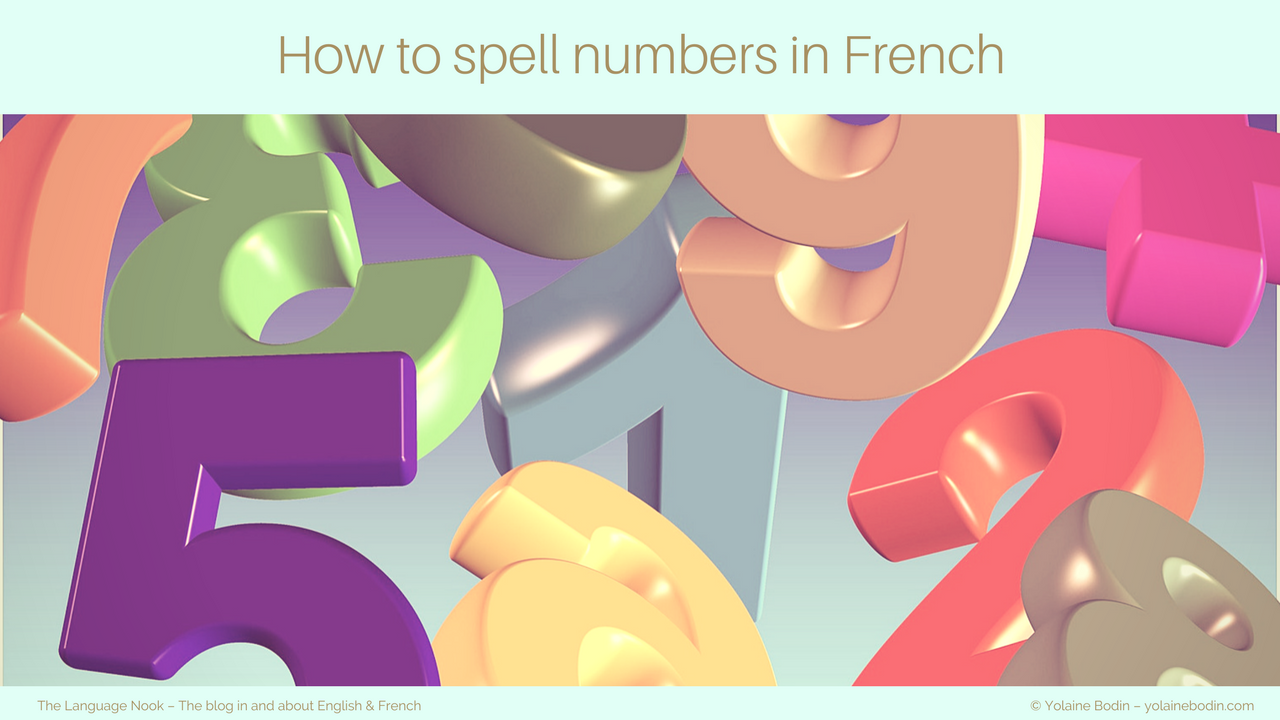Have you ever stumbled upon the spelling of French numbers? Have you ever avoided writing a number in full letters to make it easier?
If you can already count in French and you answered yes to one of these questions, then this Language Nook post is for you!
Here is THE rule:
Numbers are invariable in French, i.e. numbers are always spelt in the same way.
Thus, 2 will always be written deux, 40 quarante etc.
- J’ai rangé les quatre livres que je viens d’acheter dans ma bibliothèque. (I put the four books I’ve just bought in my bookcase.) → here, since quatre is invariable, there is no s at the end, even with the plural article les in front of it.
Note that only the number one un (1) can be put in the feminine form :
- J’ai reçu vingt et une cartes postales d’un ami qui a fait le tour du monde. (I received twenty-one postcards from a friend who’s travelling around the world.)
Careful! The number mille (thousand) is NOT an exception and therefore never takes a final s: quatre mille.
Are there any exceptions ?
Yes, but only two! The numbers vingt (twenty) and cent (hundred) when they are multiplied and not followed by another number.
What does this mean?
It’s very easy actually! Vingt and cent are invariable, too, just like the other numbers EXCEPT when they are not followed by another digit,
Look at the following examples:
- 304 → trois cent quatre → cent is followed by another digit –quatre (4)– so cent is invariable.
- 87 → quatre-vingt-sept → vingt is followed by another digit –sept (7)– so vingt is invariable.
The two previous examples follow the basic general rule explained above. But look here:
- 600 → six cents → cent is multiplied and NOT followed by another digit, so it is an exception, you need to add an s.
- 80 → quatre-vingts → vingt is NOT followed by another digit, so it is an exception, you need to add an s.
Careful! Millier (a thousand), million (a million) and milliard (a billion) are considered as nouns, so when vingt and cent are followed by these nouns, you need to add an s for the plural:
- 80 milliards → quatre-vingts milliards
- 300 millions → trois cents millions
Careful still!
When vingt and cent are used as ordinal numbers, in other words when you can replace them by the words vingtième (twentieth) or centième (hundredth), even without a digit that follows, they remain invariable. To make this easier, just remember it is used this way to give a page or a street number, or a year:
- Lisez la page quatre-vingt, puis la page deux cent. (What it really means is: Read the eightieth page, then the hundredth)
- Elle vit au quatre-vingt, rue de l’Est. (What it really means is: She lives at the eightieth number of rue de l’Est.)
- Il est né en l’an mille six cent. (What it really means is: He was born in the one thousand six hundredth year.)
Fortunately, street or page numbers as well as years are rarely written in words! 😉
To take this a little further:
Remember you need at least 2 of something to make a plural.
Hence, if the number is greater than one but does not reach 2, the noun that follows will be singular!
Let’s compare:
- 1,5 km → La plage est à 1,5 kilomètre d’ici. (The beach is 1.5 km from here.)→ kilomètre is singular because it’s less than 2.
- 2,5 km → La plage est à 2 kilomètres d’ici. (The beach is 2 km away.) → kilomètres is plural because the plural starts with 2!
Do you need to add a hyphen between numbers?
You normally put a hyphen between the numbers that are lower then a hundred on each side (trois cents, trente-huit mille), but never when the word et stands in-between (trois cent quarante et un)
However, the 1990 spelling reform allows the placement of the hyphen between all numbers, in all cases: trois-cents, trente-huit-mille, trois-cent-quarante-et-un.
The main points – Reminder
French numbers are always invariable in their spelling, except:
- round number 80 → quatre-vingts (with a final S)
- number 100 when it is multiplied and not followed by another digit: 700 = 7×100 → sept cents (with a final S)
Read this post as well if you are not sure about and need to understand the difference between the words nombre, chiffre and numéro.
There you are, you can now write French numbers in words and spell them correctly. Congratulations! 🙂





So helpful! Every time I write a check I have doubts. Thanks for the very clear summary at the end.
Thanks for your input Ellen. It’s funny how it’s nearly always at the very moment people write a cheque that they start wondering how to spell the numbers they have to write in full letters. I think we’ve all gone through this! Glad to hear this was helpful! 🙂
Thank you Yolaine,
I didn’t know “milliard “and “millions” but I never write a check with these amounts so I don’t use these numbers ! lol
You’re welcome Marianne. You can be sure I’ve never had to write cheques with such amounts either!! 😄